Eye Irritation From Contact Lenses

Reviewed by
Beck Jinnette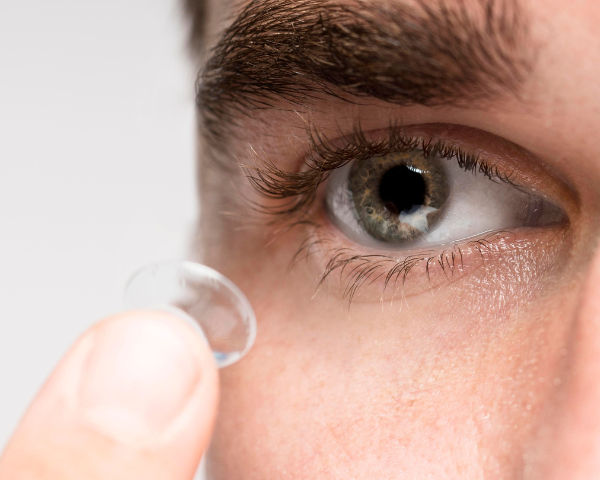
When it comes to vision correction, contact lenses are very convenient. They are the preferred choice of many people who want clear vision without having to wear eyeglasses.
Contact lenses have come a long way since they were first introduced, and are now much more advanced, comfortable and accessible.
The earliest versions of contact lenses were blown from glass and were quite large and heavy, making them far less popular than wearing glasses.
Contact lenses are worn directly on the front surface of the eye, known as the cornea, and adhere to the shape of the eye. Because of this, they offer a more natural and broader field of vision.
While contacts are an excellent choice for many, some people may experience discomfort from wearing them.
Most problems can be treated with a bit of attention and knowledge, but if you experience pain or changes in vision, it’s best to contact your eye doctor immediately.
Do contacts hurt?
Contact lenses, if worn and fitted correctly, should not hurt your eyes. Like most things, they may take a little time to get used to.
If you’re new to wearing contacts or have switched to a new brand or prescription, you may initially experience minor eye irritation. This irritation should only last a few days as your eyes are adjusting.
A glasses prescription and a contact lens prescription are different. It is important to note that you must see an eye care professional for an updated prescription before using contacts.
Wearing contact lenses with the wrong prescription can lead to symptoms such as blurry vision, headaches, eye strain or fatigue and eye pain (AAO, 2012).


What causes contact lens discomfort?
There are several reasons why you may experience discomfort from your contact lenses. Understanding the reason is the first step in alleviating the irritation.
Poorly fitted lenses
Everyone’s eyes are different—different shapes, needs and prescriptions. To ensure you are wearing the correct lenses, it is essential to have an eye exam with an eye doctor so they can write a prescription to accommodate your eyes and vision needs.
The diameter and base curve of a contact lens are two measurements that affect how the lens will fit your eye. The base curve is the measurement of the back curvature of the contact lens.
A person with a more rounded cornea needs a steeper contact lens. A person with a less rounded cornea needs a flatter contact lens.
The diameter of a contact lens is the width of the lens from edge to edge. When you wear a contact lens with the appropriate diameter, the lens will remain stable on your eye.
A contact lens with the wrong diameter can cause discomfort and may even fall out.
Allergies
Allergies are a common cause of irritated eyes for those wearing contacts. If you suffer from allergies and wear the same contacts daily, your eyes may hurt as environmental allergens like pollen, pet dander and dust build up on your contact lenses.
Contact wearers who have eye allergies may experience itchy, dry, or watery eyes. To avoid this irritation, some people may wear daily disposable lenses to ensure nothing has built up on the lens.
Another option is temporarily wearing glasses to give your eyes time to rest.
Dry eyes
Another common cause of irritation is dry eye. If your body does not produce enough tears, your eyes may become dry. Tears keep the eyes moist, protecting them from irritants and supplying nutrients.
You don’t need to cry to get the benefits; healthy eyes regularly produce tears. The benefits of tears are essential for anyone, but they can be especially helpful if you wear contacts.
While contact lenses allow oxygen and moisture to pass through to the eyes, bare eyes allow more through. If you’re experiencing discomfort from dry eyes, lubricating eye drops or artificial tears can help restore moisture.
If irritation persists, please see your eye care professional.
An eye infection
Wearing contacts will most likely worsen the symptoms if your eye becomes infected. A common eye infection among contact wearers is keratitis. Keratitis is an inflammation of the cornea, the clear tissue on the front of your eye.
If you are suffering from an eye infection, you should seek treatment from your eye doctor and avoid wearing contact lenses while your eye is healing.
A scratched eye
A scratch on your cornea may cause eye pain and lead to a more serious eye condition. If you think your eye has been scratched, it is important to see an eye care professional and wear glasses until your eye doctor confirms you can wear contact lenses again.
To avoid a scratched eye from a contact lens, take proper care of your lenses and follow the instructions for wearing and replacing them.
Dirty contact lenses
As allergens may build up on your lenses, dirt, dust and other materials may also accumulate. Unless you wear daily wear lenses, regular cleaning and disinfecting with a proper contact lens solution are essential for keeping your eyes healthy.
Cleaning contacts does not take much time and should be a priority when taking your lenses out for the day. Be sure to use the correct contact lens solution for your type of contacts. Here are some tips on how to clean your lenses properly:
- Wash your hands
- Fill your contact lens case with the proper contact solution (ensure it is fresh solution)
- Put the lens and more solution in the palm of your hand and rub the lens for about 15 seconds
- Rinse the lens with more solution
- Place the lens in the contact lens case and close it
- Repeat with the other lens
Old contacts
Contact lenses do expire, and you should never wear expired lenses as they become more exposed to bacteria. Wearing old contact lenses can irritate the eyes and cause further discomfort, irritation and problems.
Before putting in contact lenses, check the expiration date. If your lenses are expired, be sure to get new ones to avoid complications.
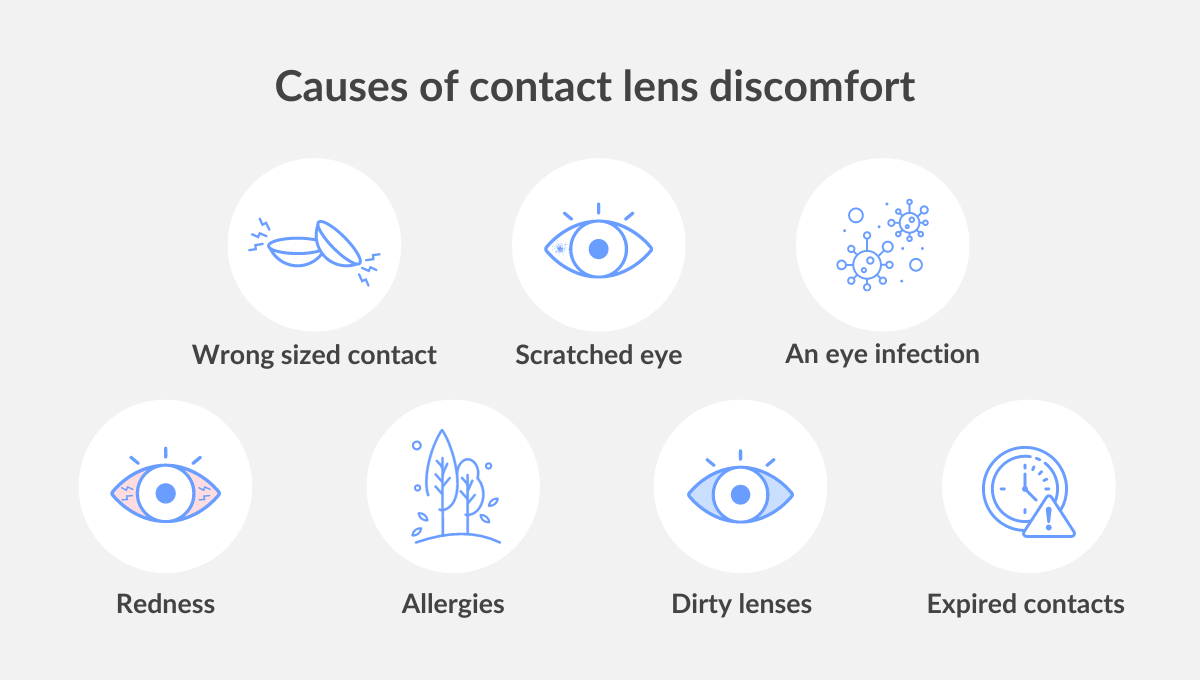
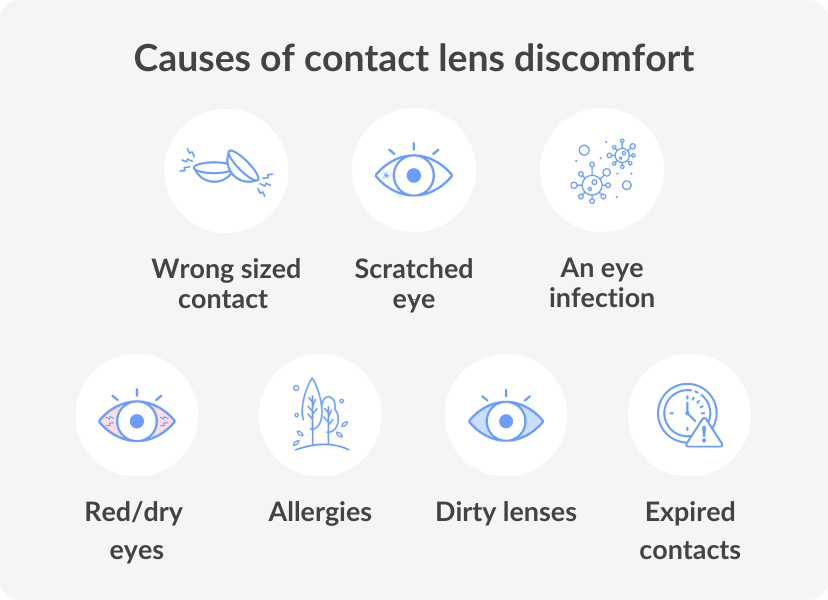
Symptoms of eye irritation from contact lenses
Symptoms may vary from person to person and depend on the cause of the discomfort. Generally, symptoms of eye irritation from contact lenses include burning, stinging, or itchy eyes.
Some wearers might feel that a foreign body is stuck in the eye, like an eyelash or a piece of dirt. Other symptoms may include unusual eye secretions, redness, reduced sharpness of vision, blurred vision and light sensitivity.
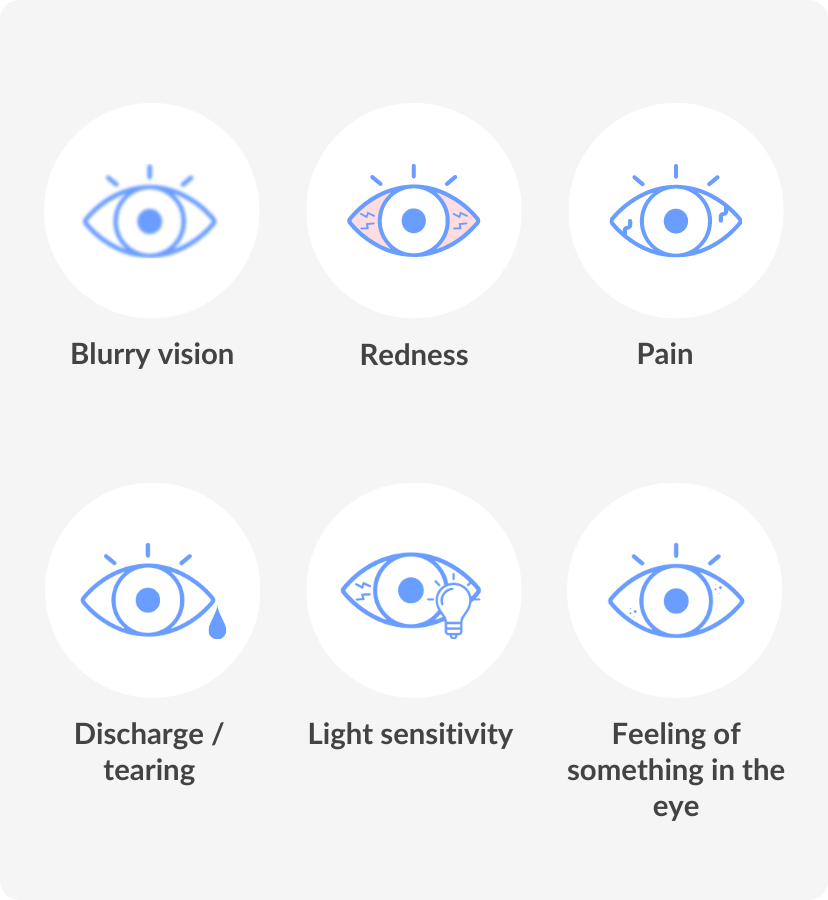
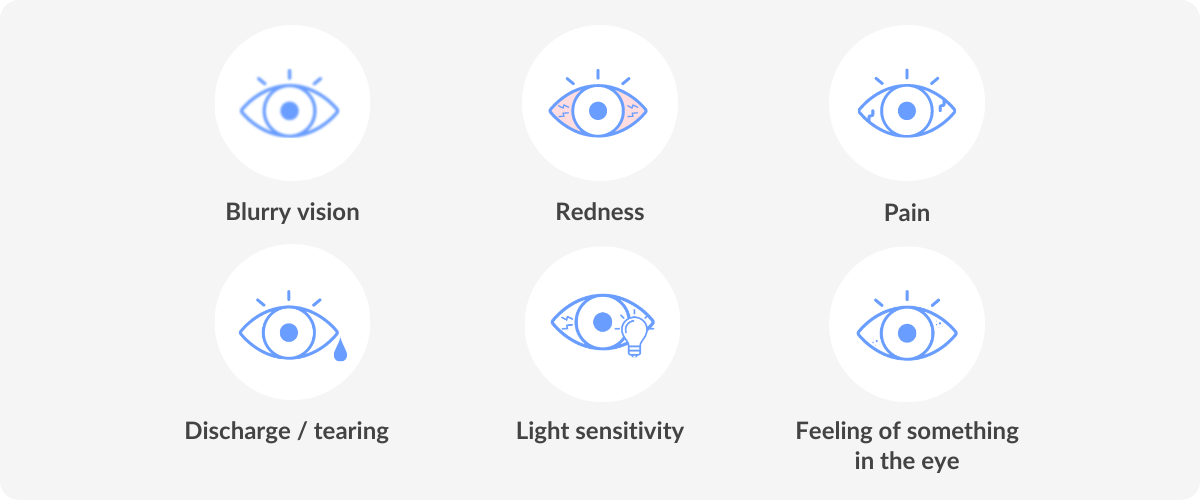
Eye health should always be a priority. If you’re experiencing discomfort or pain persists, contact your eye doctor immediately.
DID YOU KNOW?
Contact lenses should not cause discomfort or irritation when used and worn correctly.
How to relieve contact lens discomfort
To avoid eye irritation, you can take a few measures to find relief. The first is always to make sure to clean your lenses properly. Cleaning your contacts with the proper solution will keep dirt, dust and other objects off your lenses and out of your eyes.
Before putting in contacts, wash your hands. Use soap and tap water to ensure your hands are clean before touching your contacts or eyes. If your lenses are scratched, expired, or ruined somehow, do not wear them.
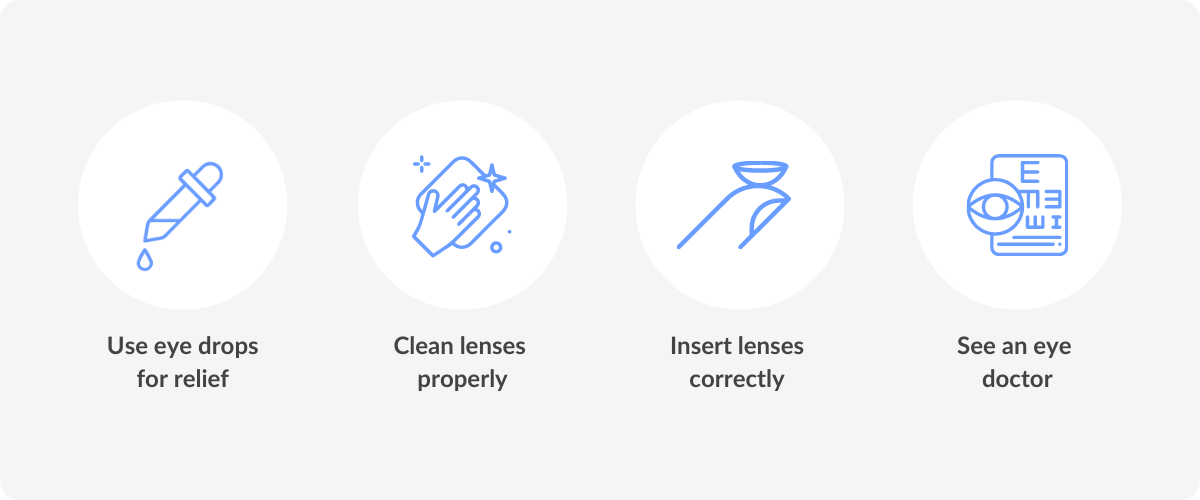
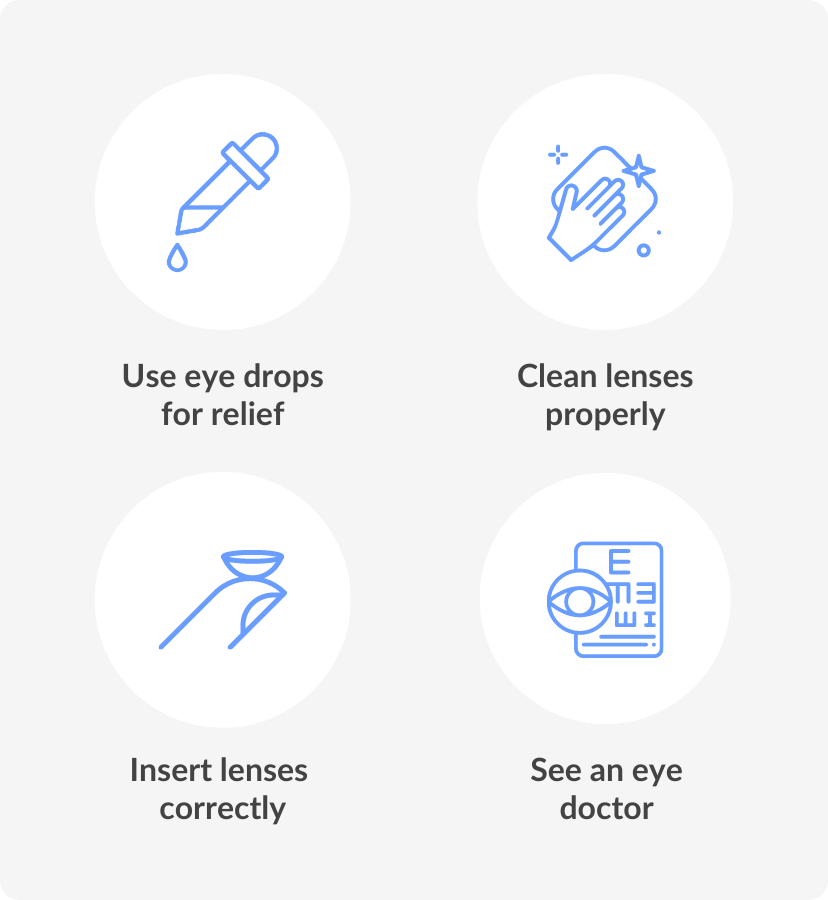
As always, speaking with your eye doctor is the best way to understand the cause of the irritation and how to address it.
Can contact lenses cause an eye infection?
While rare, it is possible that contact lenses can cause eye infections.
Certain things may increase the chances of getting an eye infection, including using extended-wear contact lenses, sleeping in your contacts, dirty lenses or lens cases and having dirt or bacteria accumulate on the lenses.
You should also avoid showering, swimming, or bathing in contact lenses. Swimming with contacts increases your risk of irritation and even infection.
How to take care of your contact lenses
Taking proper care of your contact lenses is essential in avoiding eye irritation and infections. Proper handling, cleaning, storage and use of your contacts are crucial. A contact lens is delicate, so treat it carefully to avoid bending or tearing it.
Before touching your contact lenses, thoroughly wash and dry your hands. Be sure to clean the lenses and the case regularly with a solution appropriate for your lenses and never reuse or mix solutions.
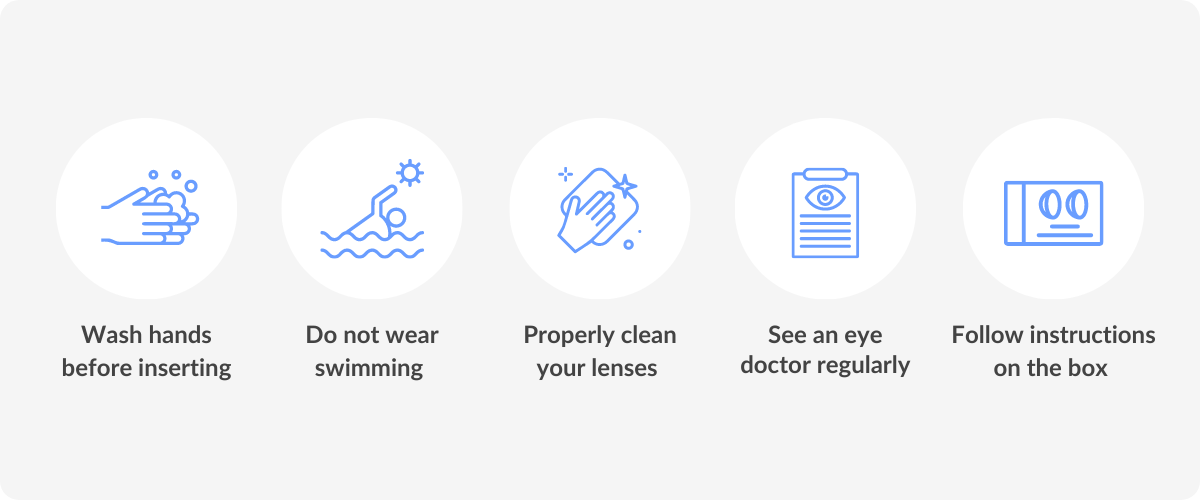
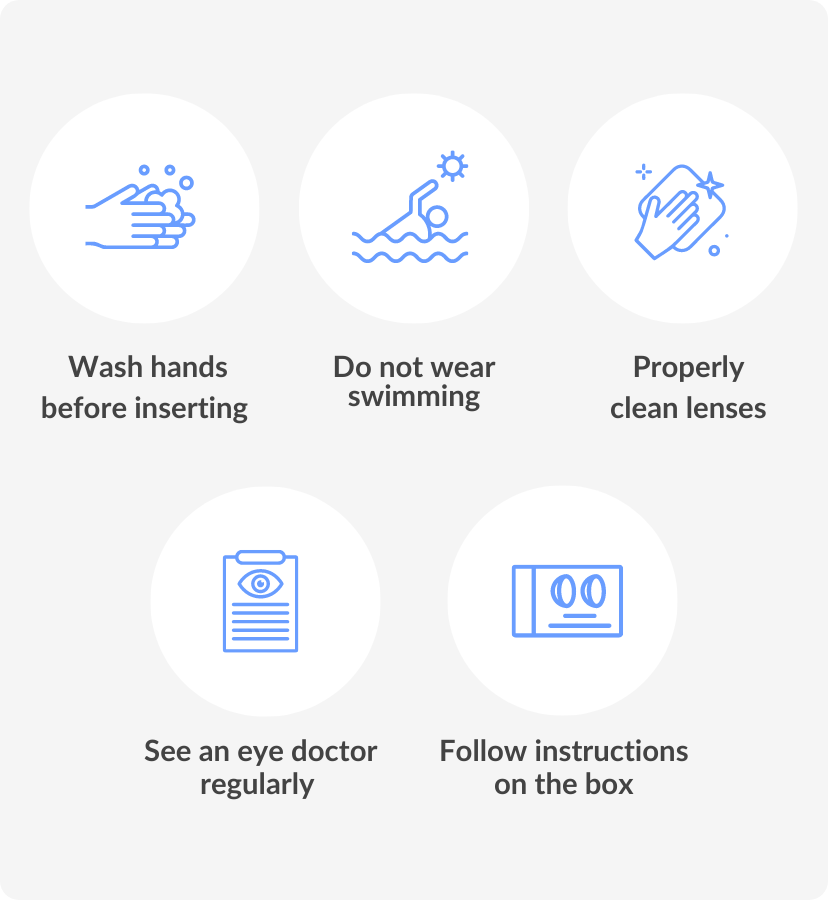
Wearing contact lenses has plenty of benefits, and they’re a great option for vision correction. Contacts are a preferred choice for many as they won’t obstruct your view or stop you from playing sports and competing in outdoor activities.
With a bit of care for and attention to your lenses and eyes, there is no reason why you should ditch them for a pair of glasses.
If you have any questions about contact lenses and how to care for them, head to our Optical Center to speak with one of our in-house opticians today.
Reference List
American Academy of Ophthalmology. (2023). Can outdated contact lenses harm your eyes? Retrieved August 10, 2023, from
https://www.aao.org/eye-health/ask-opthalmologist-g/wearing-outdated-contacts
Related articles
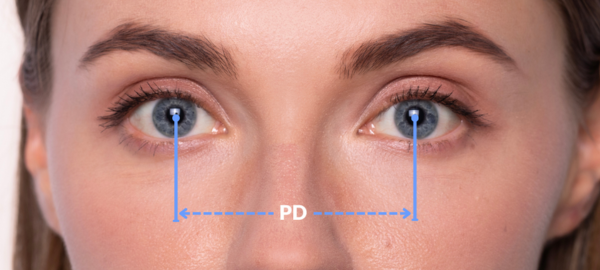
Related articles











































